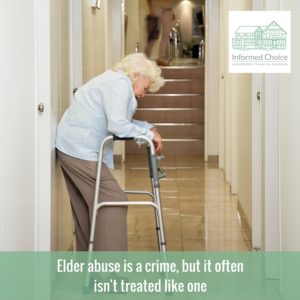 Elder abuse is a crime, but it often isn’t treated like one
Elder abuse is a crime, but it often isn’t treated like one
Elder abuse is defined by the World Health Organisation as “a single, or repeated act, or lack of appropriate action, occurring within any relationship where there is an expectation of trust, which causes harm or distress to an older person.”
It is also sometimes called “elder mistreatment,” “senior abuse,” “abuse in later life,” “abuse of older adults,” “abuse of older women,” and “abuse of older men”.
As a firm of Chartered Financial Planners often working with vulnerable elderly clients, we were pleased to hear that national charity Action on Elder Abuse (AEA) is launching a campaign calling for elder abuse to be made an aggravated criminal offence.
New research carried out by Action on Elder Abuse suggests that the Criminal Justice system is failing to deliver for older people who are the victims of abuse, theft and neglect.
They used a series of Freedom of Information requests to discover the authorities are failing to keep any significant records of the experiences of older people.
One police force who did provide information admitted that it investigated 76 cases in a year and issued a police caution in each case.
Not one elder abuse case reached court so none of the perpetrators received a criminal conviction as a result of their actions.
The charity explains that police cautions are seen as a quick and cheap way to deal with the problem but they hide what is actually happening to these vulnerable, frail older victims of abusive crimes.
Within its report, Action on Elder Abuse documents 23 cases of elder abuse where not one perpetrator received a custodial sentence, despite the horrendous circumstances of abuse.
These cases included a 71 year old man beaten so badly that his jaw required wiring, a couple torn apart by abuse after 63 years of marriage and subsequently dying apart, and an elderely man so badly neglected in a care home that visitors were overcome by urine and faeces.
In all of these cases, the sentence was suspended or community service.
If adopted, the new aggravated offence which is being proposed will cover physical, sexual, financial and psychological abuse as well as neglect.
It will set statutory minimum sentences for perpetrators, which courts may extend when necessary, as well as a requirement for mandatory reporting of suspected elder abuse.
According to Gary Fitzgerald, Chief Executive of Action on Elder Abuse:
“Elder abuse is a crime and its long overdue for it to be treated as one,”
“The UK has slipped far behind other countries in this regard, and we are allowing perpetrators to act with impunity. This has to stop.
“We have to send a clear message to these people that crimes against older people will no longer be tolerated and treated leniently.”
“I have no doubt that the Government will argue that we already have enough laws.”
“But they didn’t argue that about racially or religiously motivated crimes, that’s why we have the Crime and Disorder Act 1998.
“It’s time they stopped treating our elderly, frail mums and dads as second class citizens.”
Action on Elder Abuse noted that, in the UK, between 500,000 and 800,000 older people are abused in their own homes each year.
By way of comparison, the National Society for the Prevention of Cruelty to Children estimates 400,000 children face abuse each year.
In 2013/14 there were only 28,000 cases substantiated by adult protection teams in England, but only 3,317 referrals, just under 12%, to the police to the Crown Prosecution Service.
Action of Elder Abuse operates a dedicated Helpline which provides information, advice and support to victims and others who are concerned about or have witnessed abuse, neglect or financial exploitation.
If you ever have cause for concern, please do call the Helpline on 080 8808 8141.
[tweet_box]Up to 800,000 older people are abused in their own homes in the UK each year[/tweet_box]
